The International Criminal Court (ICC) is an international judicial body that was formed by a multilateral treaty called the Rome Statute. The ICC, which is independent of the United Nations, is based in The Hague, the Netherlands, although it may sit elsewhere.
The ICC is composed of four primary organs: the Presidency, the Judicial Divisions, the Office of the Prosecutor, and the Registry.
The Assembly of States Parties serves as the Court’s management, oversight, and legislative body and is not an organ of the Court. It establishes the budget, elects judges and prosecutors, amends law and procedure, and conducts other activities consistent with the Rome Statute.
Also separate from the Court is the Trust Fund for Victims, which was created by the Assembly of States Parties (as specified in Article 79 of the Rome Statute) to provide assistance and support to victims of Rome Statute crimes and their families and to help implement Court-ordered reparations. The Trust Fund for Victims seeks to promote restorative justice, reconciliation, and sustainable peace by attempting to address the direct harms of atrocity crimes.
Presidency
- Represents the ICC externally
- Organizes the Judicial Chambers and assigns cases
- Perform a select number of judicial functions
The Presidency is responsible for the overall administration of the Court, with the exception of the Office of the Prosecutor, and for specific functions assigned to the Presidency in accordance with the Statute.
Composition
The Presidency is one of the ICC’s four Organs. Its President and First and Second Vice-Presidents are all elected by an absolute majority of the Judges of the Court for a three year renewable term and serve full time.
Responsibility
The Presidency is responsible for judicial/legal functions, administration, and external relations of the Court. The Presidency constitutes Chambers (assigning certain judges to each) and assigns cases, conducts judicial review of certain decisions of the Registrar and concludes Court-wide cooperation agreements with States. The Presidency ensures proper administration of the Court (except the Office of the Prosecutor which is responsible for its own administration) and oversees the work of the Registry. The Presidency also maintains relations with States and other entities and promotes public awareness and understanding of the Court through external relations.
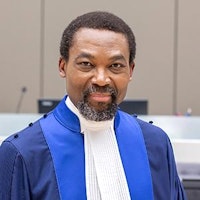
Judge Chile Eboe-Osuji (Nigeria), President
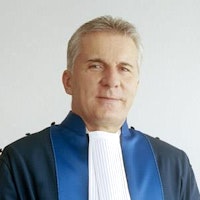
Judge Robert Fremr (Czech Republic), First Vice-President
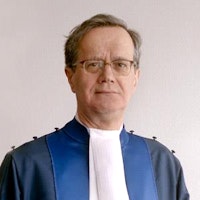
Judge Marc Perrin de Brichambaut (France), Second Vice-President
Chambers
- Issue Arrest Warrants
- Determine Jurisdiction and Admissibility
- Confirm or Reject Charges
- Adjudicate Cases
- Hear Appeals
The Chambers consist of eighteen judges organized into the Pre-Trial Division, the Trial Division, and the Appeals Division. The judges of each Division are then divided into Chambers which are responsible for conducting the proceedings of the Court on specific cases and situations at different stages of the judicial procedure.
Composition
The judiciary of the Court is composed of three Divisions: The Appeals Division, the Trial Division and the Pre-Trial Division. The Appeals Chamber consists of all five judges of the Appeals Division. The Pre-Trial and Trial Chambers consist of three judges each from their respective Divisions. In addition, many of the functions of the Pre-Trial Chamber may be carried out by a Single Judge sitting as his own Chamber. The Presiding Judge of a Chamber is elected by the judges of the Chamber in question. The Appeals Chamber decides on a Presiding Judge for each appeal.
Responsibility
The Pre-Trial Chamber plays an important role in the first phase of judicial proceedings and makes the decision whether to confirm the charges against the potential accused. After charges are confirmed, the Trial Chamber determines the innocence or guilt of the accused, imposes a sentence on a convicted person, and may order a convicted person to pay money for compensation, restitution, or rehabilitation for victims. If either the Prosecutor or the convicted person appeal the decision of the Trial Chamber, the Appeals Chamber may decide to reverse or amend the decision or sentence or order a new trial before a different Trial Chamber.
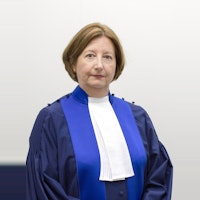
Judge Silvia Alejandra Fernández De Gurmendi, Appeals Division (Argentina)
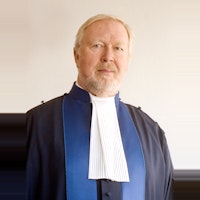
Judge Howard Morrison, Appeals Division (United Kingdom)
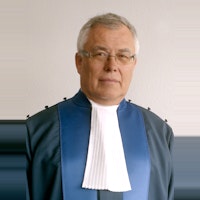
Judge Piotr Hofmański, Appeals Division (Poland)
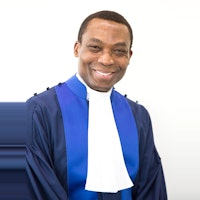
Judge Chile Eboe-Osuji, President of the Trial Division (Nigeria)

Judge Joyce Aluoch, Trial Division (Kenya)
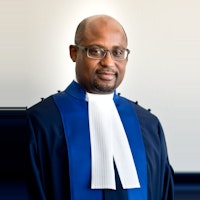
Judge Geoffrey A. Henderson, Trial Division (Trinidad and Tobago)
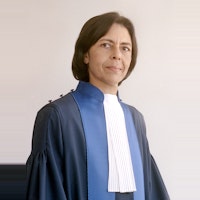
Judge Olga Venecia Del C. Herrera Carbuccia, Trial Division (Dominican Republic)
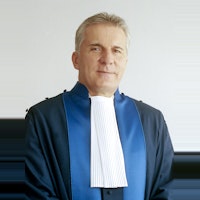
Judge Robert Fremr, Trial Division (Czech Republic)

Judge Bertram Schmitt, Trial Division (Germany)
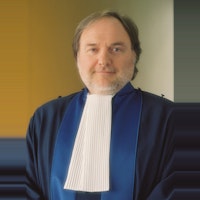
Judge Cuno Tarfusser, President of the Pre-Trial Division (Italy)
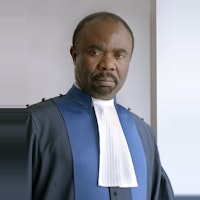
Judge Antoine Kesia-Mbe Mindua, Pre-Trial Division (Democratic Republic of the Congo)
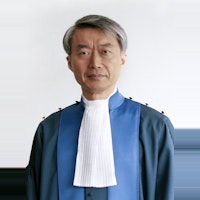
Judge Chang-ho Chung, Pre-Trial Division (Republic of Korea)

Judge Péter Kovács, Pre-Trial Division (Hungary)
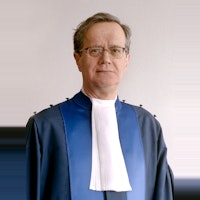
Judge Marc Perrin De Brichambaut, Pre-Trial Division (France)
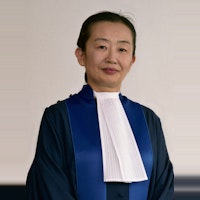
Judge Kuniko Ozaki, Trial Division (Japan)

Judge Sanji Monageng, Appeals Division (Botswana)

Judge Christine Van den Wyngaert, Appeals Division (Belgium
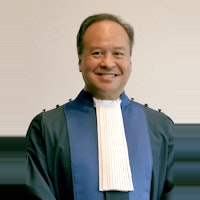
Judge Raul Cano Pangalangan
Office Of The Prosecutor
- Analyze Jurisdiction and Admissibility
- Work with Governments and other Actors to Facilitate Cooperation
- Investigate Crimes
- Prosecute Individuals
The Office of the Prosecutor (OTP) is responsible for receiving referrals and any substantiated information on crimes within the jurisdiction of the Court. OTP examines these referrals and information, conducts investigations, and conducts prosecutions before the Court.
Composition
OTP is composed of three Divisions. The Prosecutor, Fatou Bensouda, makes the final decisions on the commencement of investigations and prosecutions. The Deputy Prosecutor, James Stewart, is in charge of all the Divisions; Phakiso Mochochoko is the Head of the Jurisdiction, Complementarity and Cooperation Division; Fabricio Guariglia is the Head of the Prosecutions Division; and Michel de Smedt is the Head of the Investigations Division.
Responsibility
First, OTP performs preliminary analysis on the referrals and information on crimes that it receives to determine if they meet the jurisdictional requirements to merit an investigation. If OTP determines that the situation meets jurisdictional requirements, then it conducts an investigation into the situation. Should the investigation yield enough evidence to merit the issuing of arrest warrants, OTP applies to the Pre-Trial Chamber for the issuance of a warrant or a summons to appear. After the accused has been arrested or summoned to court voluntarily, OTP presents its charges and its evidence to the Pre-Trial Chamber and the Pre-Trial Chamber determines whether to confirm the charges. After charges are confirmed, OTP conducts the entirety of the prosecution at trial.
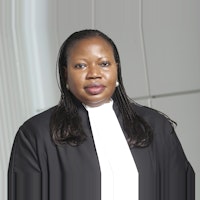
Mrs. Fatou Bensouda, ICC Prosecutor (The Gambia)

Phakiso Mochochoko, Head of the Jurisdiction, Complementarity and Cooperation Division (Lesotho)
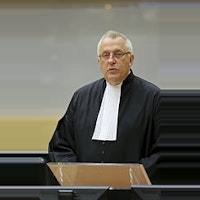
James Stewart, Deputy Prosecutor (Canada)

Michel De Smedt, Director of the Investigation Division (Belgium)

Fabricio Guariglia, Director of the Prosecutions Division (Argentina).
Registry
- Administer Court Services
- Assist External Defense and Victims Counsel
- Organize Witness & Victims Protection
- Facilitate Victim Participation and Reparations
The Registry provides judicial and administrative support to all organs of the Court and carries out its specific responsibilities in the areas of defense, victims and witnesses, outreach and detention.
Composition
It is headed by the Registrar who is the principal administrative officer of the Court and oversees various offices and sections that perform specific administrative and supportive tasks.
Responsibility
In addition to providing all administrative support for the Court’s activities both at the headquarters in The Hague and in the field, the Registry has specific responsibilities in particular areas of the Court’s mandate. In the area of defense, the Registry protects the rights of defendants by administering the legal aid program for indigent defendants and providing various forms of assistance to defense counsel. The Registry provides a similar counsel support function to victims as well as ensuring the safety and support of witnesses and victims. The Registry also performs an essential outreach function by ensuring that affected communities in situations subject to investigation or proceedings can understand and follow the work of the Court through the different phases of its activities. The Registry is also responsible for administering and coordinating the detention of all those detained under the ICC’s authority.

Herman von Hebel, Registrar (The Netherlands)
Assembly of State Parties
- Change ICC Law and Procedures
- Elect Judges and Prosecutors
- Determine ICC's Budget
- Provide oversight on Court administration to Presidency, Registrar, and Prosecutor
- Consider questions of non-cooperation
- Consider reports and take other actions consistent with the Rome Statute
The Assembly of State Parties (ASP) is the management, oversight, and legislative body of the Court, and its role is described in Article 112 of the Rome Statute. Each State Party has one vote in the ASP. Both the ASP and its Bureau attempt to make decisions by consensus, and when consensus cannot be reached make decisions by two-thirds majority (on matters of substance) and simple majority (on procedure). In addition, the President of the Court, the Prosecutor and the Registrar or their representatives may participate in meetings of both the ASP and the Bureau when appropriate.
Composition
The ASP is made up of representatives of the various states that have ratified and acceded to the Rome Statute (States Parties). States that have signed the Rome Statute may also send observer delegations to the ASP.
The ASP has a Bureau that supports its work. The Bureau includes a President, two Vice-Presidents and 18 elected (for three-year terms) members, and according to Rome Statute Art. 112 should “have a representative character, taking into account, in particular, equitable geographical distribution and the adequate representation of the principal legal systems of the world.”
Responsibility
The ASP sets the rules and regulations of the Court and makes various decisions related to management and oversight, such as the adoption of normative texts and of the budget, the election of judges, the Prosecutor and Deputy Prosecutor(s), and any issues related to non-cooperation. The ASP also provides oversight to the Presidency, Registrar, and Prosecutor and has the ability to establish subsidiary bodies, such as independent oversight mechanisms.

H.E. O-Gon Kwon, President (Republic of Korea)

H.E. Jens-Otto Horslund, Vice-President (Denmark)

H.E. Michal Mlynár, Vice-President (Slovakia)
Trust Fund for Victims
- Support victims and their families through reparations and assistance.
The Trust Fund serves victims of crimes that fall within the Court’s jurisdiction through the provision of 1) general assistance including physical rehabilitation, psychological rehabilitation, and/or material support and 2) implementation of reparations awards ordered by the Court against a convicted person.
Composition
The TFV is guided by a Board of Directors, the five members of which are elected by the Assembly of Parties for three-year terms. Members of the Board of Directors serve pro bono.
The TFV uses fines and forfeitures of persons convicted through ICC proceedings, as well as through voluntary donations from states and individual donors. The TFV works with national and international partners to implement its programs through a grant-making process.
Responsibility
The two mandates of the TFV, general assistance and reparations, were established to provide support to victims of genocide, crimes against humanity and war crimes. While reparations are linked to accountability, arising from individual criminal responsibility of a convicted person, the assistance mandate is not and can address broader implications of the crimes and conflict at issue.
Through its assistance mandate, the TFV provides assistance to victims and their families independently from the conviction of a particular person, or before a conviction happens. This allows for assistance to reach victims and affected communities more quickly, and reaches victims of crimes committed in the conflict at issue without the requirement that they be directly tied to charges and the case against a particular defendant. Assistance activities are funded by voluntary contributions.
The TFV fulfills its reparations mandate by creating plans and programs to implement reparations orders decided by the Court. Although reparations can be direct and aimed at individuals, including individual compensation or material support and physical or psychological rehabilitation. They can also be collective or symbolic, which might address broader societal or collective harm caused by atrocity crimes. These possibilities allow for the Court to be responsive to the context of specific cases and the wishes of victims, and for reparations measures to encourage restoration, reconciliation and address community-wide needs.
Since 2008, the Trust Fund has implemented projects in Uganda, the Democratic Republic of the Congo, Kenya, and the Central African Republic, and is launching an assistance program in Côte d’Ivoire. The Trust Fund is also working to implement reparations orders in several cases.






























